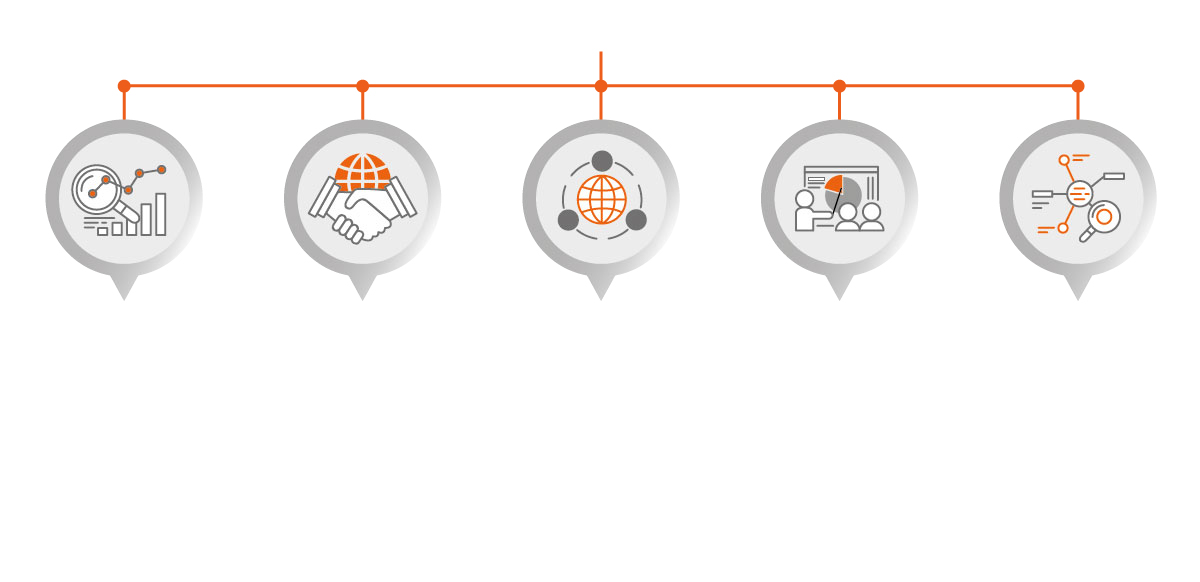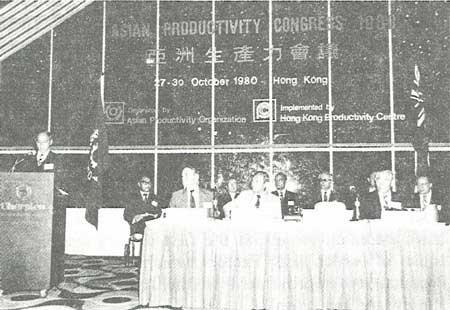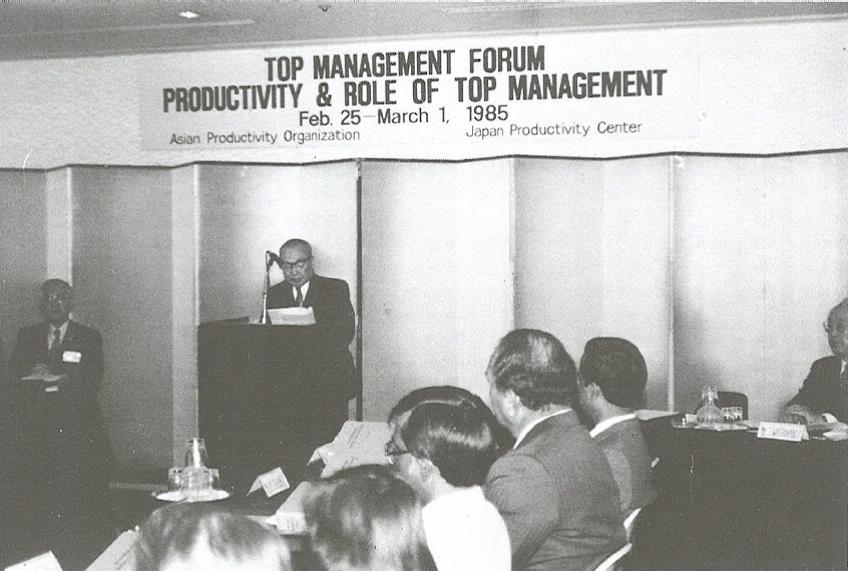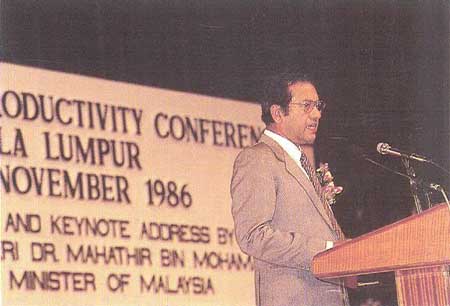APO COE on Business Excellence
In recognition of the importance of strengthening the BE capabilities of APO member countries, the 51st GBM designated SPRING Singapore as the pilot COE on BE in 2009. It was originally to be supported by the APO for two years. The support was then extended to March 2013.
Key Objectives
The following were the key objectives of the COE on BE established at the outset:
- Facilitate learning and sharing of best practices and the adoption of BE frameworks among enterprises in APO member countries;
- Conduct research on BE and provide leadership in this area in the region;
- Develop resources and training materials to assist APO members in their BE and national QA programs;
- Build a database of experts and senior assessors from Singapore and overseas who could assist APO member countries with their BE-related programs; and
- Enhance the international visibility of BE efforts in APO member countries, including QA winners, throughout the APO region.
Accomplishments and Outcomes
- Facilitating best practice sharing: Four two-day BE Global Conferences were organized in 2009, 2010, 2011, and 2012. The conferences involved overseas and local experts and practitioners from BE award-winning companies. Over 2,000 delegates from 25 countries participated in the conferences. The COE also hosted study visits from Fiji, the ROK, Malaysia, Mongolia, the Philippines, Thailand, and Vietnam. A dedicated webpage linked to the APO website was created by the COE which provides easy access to BE publications, training materials, and frameworks. Each NPO designated BE administrators who have free access to case studies and benchmarking data on leading international BE models.
- Developing the competencies of BE assessors and consultants: Workshops for BE assessors, consultants, and practitioners were organized, and a total of 150 participants from 16 member countries were trained. Training manuals were developed from the inputs of the BE workshops and are now utilized in APO training courses on the subject. As a result of this intervention, there are now BE assessors and consultants in several member countries.
- Enhancing the capabilities of member countries in managing their BE initiatives: The COE has helped member countries develop and strengthen their BE initiatives. It has assigned experts mainly from Singapore to Bangladesh, Fiji, Malaysia, Pakistan, the Philippines, and Thailand. It has assisted member countries such as Bangladesh and Pakistan in developing BE action plans.
- Undertaking research: Research on the Impact of BE/QAs on Enterprises was conducted by experts from the Center for Organizational Excellence Research, School of Engineering and Advanced Technology, Massey University, New Zealand. The research assessed the impact of existing BE/QA frameworks on enterprises in the APO membership. The key research findings were presented at the APO Regional Meeting on BE/QA Systems held in Thailand. The COE took into consideration the key BE priorities identified through this research in the development of its work plans. One of the findings from the research was the need to increase BE awareness among SMEs. Thus, the COE organized a regional workshop and developed a self-help toolkit on BE for SMEs in print and e-book versions.
- Strengthening and sustaining the leadership of the COE on BE: To strengthen the capabilities of the COE and maintain its leadership, experts from the US Malcolm Baldrige National Quality Award and European Foundation for Quality Management were sent to Singapore to provide international dimensions to the Singapore Quality Award. Singapore was able to benchmark the performance of its enterprises and learn international best practices through the COE’s networks, platforms, and resources. In addition, Singapore’s BE initiative has become a recognized brand in the region.
COE Events and Activities
Best Practice Sharing
| 17–20 October 2011 | Business Excellence Global Conference, Singapore |
|---|---|
| 18 October 2011 | BE CEO Roundtable, Singapore |
| 9–10 November 2010 | BE Global Conference About 400 participants from 16 countries, including APO member countries, attended the conference. BE practitioners and experts from the USA, Europe, India, Indonesia, Thailand, the Philippines, New Zealand, and Singapore spoke at the conference. |
| 8 November 2010 | BE CEO Roundtable Twenty business leaders from various countries attended the BE CEO Roundtable to share their experiences in steering their organizations through the global economic crisis. Mr. C.V. Jagadish, CEO, Systems on Silicon Manufacturing Company Pte. Ltd., chaired the discussion. |
| 15–18 December 2009 | Conference on Quality Award Winners and APO Regional Meeting on Quality Award Winners and BE Systems in Thailand The COE facilitated the participation of Mr. C.V. Jagadish, CEO, Systems of Silicon Manufacturing Company Pte. Ltd., a Singapore Quality Award winner, as a speaker at the conference. |
| 3–4 November 2009 | BE Global Conference About 500 participants from 22 countries, including APO member countries, attended the conference. Experts and BE program administrators from the USA, Europe, Australia, Japan, Thailand, India, New Zealand, Mexico, and Singapore spoke at the conference. There were also presentations by BE/quality award winners from Japan, India, Thailand, Denmark, Australia, Mongolia, the USA, and Singapore. |
| 24–28 August 2009 | Multicountry Observational Study Mission on Quality Awards in APO Member Countries to Japan This study mission focused on management excellence for SMEs, and the COE provided a speaker from a Singapore SME Business Excellence Award winner, Teckwah Industrial Corporation Ltd., to shared best practices with participants. |
Competencies of BE Stakeholders
| 17–21 October 2011 | APO Workshop for BE Consultants, Singapore |
|---|---|
| 19–20 May 2011 | Workshop to Develop a BE Consultants’ Manual, Singapore |
| 24–25 March 2011 | Workshop to Develop a Self-help Toolkit on BE for SMEs, Singapore |
| 2010 | Development of a BE Assessors’ Training Manual This manual comprises a trainer’s guide and a participant’s workbook. |
| 8–12 November 2010 | Regional Training Workshop for Senior BE Assessors Eighteen participants from 11 APO member countries attended the workshop, which was aimed at enhancing their capabilities to train assessors in their own countries and at gathering their feedback on the Assessors’ Training Manual developed by the COE. |
| 5–6 November 2009 | Workshop for Senior BE Assessors Eighteen participants from 10 APO member countries attended this workshop, where the core competencies of assessors were identified. The COE worked on the Assessors’ Training Manual as a follow-up to this workshop. |
Capability Development of APO Members
| 11–16 July 2011 | One Singaporean expert visited the NPO of Pakistan for Quality Award Assessor Development Training. |
|---|---|
| 25–27 January 2011 | Visit by a Study Team from the President’s Office, Mongolia, to Singapore, on BE. |
| 2010 | The COE sent experts to Thailand and Pakistan to advise on initiatives to develop or strengthen BE programs. |
| 2010 | Development of a database on BE experts was initiated. This database serves as a useful reference to help APO members identify suitable experts to assist them or organizations in their countries. |
| 2009 | The COE assigned an expert from 4–7 October to help the Development Academy of the Philippines develop an action plan to enhance the Philippine Quality Award program. |
| 2009 | The COE assigned an expert from 2–3 August to help the NPO of Bangladesh develop an action plan to introduce a quality award program. |
Capability Development of APO Members
| 11–16 July 2011 | One Singaporean expert visited the NPO of Pakistan for Quality Award Assessor Development Training. |
|---|---|
| 25–27 January 2011 | Visit by a Study Team from the President’s Office, Mongolia, to Singapore, on BE. |
| 2010 | The COE sent experts to Thailand and Pakistan to advise on initiatives to develop or strengthen BE programs. |
| 2010 | Development of a database on BE experts was initiated. This database serves as a useful reference to help APO members identify suitable experts to assist them or organizations in their countries. |
| 2009 | The COE assigned an expert from 4–7 October to help the Development Academy of the Philippines develop an action plan to enhance the Philippine Quality Award program. |
| 2009 | The COE assigned an expert from 2–3 August to help the NPO of Bangladesh develop an action plan to introduce a quality award program. |
Research
| 2009 | APO Research Survey on BE Impact on Adopting Organizations The COE provided inputs on the research methodology, broad areas for investigation, and survey questionnaire for this APO research conducted by Dr. Robin Mann, Director, Centre for Organisational Excellence Research, Massey University, New Zealand. The key research findings were presented at the APO Regional Meeting on BE/Quality Award Systems in Thailand in December. The COE took into consideration the key BE priorities identified through this research in the development of its 2010 and 2011 work plans. |
|---|
Knowledge Transfer to the COE
| 19–25 July 2011 | One US expert visited Singapore for enhancing the institutional capability of the APO’s designated COE, SPRING Singapore, in administering the Singapore Quality Award. |
|---|---|
| 2010 | Two experts from the USA and Europe were assigned to the COE in July to provide advice on the COE’s Assessors’ Training Manual and to share best practices in BE. |
| 2009 | Two experts from the USA and Europe were assigned to the COE in July to provide advice on the BE Award assessment process in Singapore and to help ensure that the assessment process advocated by the COE continues to be internationally aligned. |
BE Reference Materials
Toolkit for Trainers
- Business Excellence Practitioner Training (2MB)
- Business Excellence Assessor Training (667KB)
- Business Excellence Assessor Training Manual: Trainer Guide (667KB)
- Business Excellence Assessor Training Manual: Assessor Workbook (325KB)
- Business Excellence Consultant Training: Trainer Guide (667KB)
- Business Excellence Consultant Training: Slides (3MB)
- Impact of Business Excellence/Quality Awards on Enterprises (3.7MB)
Self-help Toolkit/Guidebook on BE
- Understanding Business Excellence: An awareness guidebook for SMEs (387KB)
- Understanding Business Excellence: An awareness guidebook for SMEs (slide set) (333KB)
- BE Awareness Poster
- Implementing Business Excellence: A guidebook for SMEs (664KB)
- Engaging SMEs in Business Excellence: A guidebook for National Productivity Organizations (161KB)
- Business Excellence Models and Awards for the Public Sector: A Guidebook for National Productivity Organizations (860KB)
BE Models in APO Members
Fiji
 The Fiji Business Excellence Awards (FBEAs) were launched in 1998, with the aim of encouraging organizations to implement quality and productivity measures in the workplace. The FBEA framework is based on the Australian Business Excellence framework and is comparable with other awards throughout the world.
The Fiji Business Excellence Awards (FBEAs) were launched in 1998, with the aim of encouraging organizations to implement quality and productivity measures in the workplace. The FBEA framework is based on the Australian Business Excellence framework and is comparable with other awards throughout the world.
Japan
 The Japan Quality Award was established in 1995 by the Japan Productivity Center (formerly known as Japan Productivity Center for Socio-Economic Development). It was modeled after the concept of self-assessment of organizational work and is structured in such a way that any organization, regardless of its business or size, can use it to assess performance.
The Japan Quality Award was established in 1995 by the Japan Productivity Center (formerly known as Japan Productivity Center for Socio-Economic Development). It was modeled after the concept of self-assessment of organizational work and is structured in such a way that any organization, regardless of its business or size, can use it to assess performance.
Malaysia
 The Industry Excellence Awards in Malaysia are aimed at promoting quality awareness among various organizations, promoting the adoption of quality values in organizations, encouraging healthy competition among organizations for continuous improvement of quality, and encouraging information sharing on successful performance strategies and the benefits derived from using these strategies.
The Industry Excellence Awards in Malaysia are aimed at promoting quality awareness among various organizations, promoting the adoption of quality values in organizations, encouraging healthy competition among organizations for continuous improvement of quality, and encouraging information sharing on successful performance strategies and the benefits derived from using these strategies.
Pakistan
 The Prime Minister’s Quality Award was developed on the basis of globally recognized BE principles found in the Malcolm Baldrige National Quality Awards and other similar schemes. Its intent is to promote awareness of productivity and its impact on competitiveness, disseminate the requirements for excellence in quality, and share information on successful strategies and on benefits derived.
The Prime Minister’s Quality Award was developed on the basis of globally recognized BE principles found in the Malcolm Baldrige National Quality Awards and other similar schemes. Its intent is to promote awareness of productivity and its impact on competitiveness, disseminate the requirements for excellence in quality, and share information on successful strategies and on benefits derived.
Philippines
 The Philippine Quality Award is the highest level of national recognition for exemplary organizational performance. It aims to stimulate local companies and organizations to improve quality and productivity for the pride of recognition while obtaining a competitive edge and providing examples to others. It also promotes the sharing of information and benchmarking of best practices and results among organizations pursuing quality improvement.
The Philippine Quality Award is the highest level of national recognition for exemplary organizational performance. It aims to stimulate local companies and organizations to improve quality and productivity for the pride of recognition while obtaining a competitive edge and providing examples to others. It also promotes the sharing of information and benchmarking of best practices and results among organizations pursuing quality improvement.
Singapore
 The BE model adopted in Singapore is based on universally accepted standards of the US Malcolm Baldrige Performance Excellence Program, EFQM Excellence Award, and Australian Business Excellence Award. It helps organizations to strengthen their management systems and capabilities to enhance their competitiveness.
The BE model adopted in Singapore is based on universally accepted standards of the US Malcolm Baldrige Performance Excellence Program, EFQM Excellence Award, and Australian Business Excellence Award. It helps organizations to strengthen their management systems and capabilities to enhance their competitiveness.
Thailand
 The Thailand Quality Award (TQA) is widely recognized as the most prestigious quality award in Thailand and the symbol of world-class performance excellence. It aims to improve organizations’ competitiveness through implementation of TQA criteria, stimulate organizational learning and sharing of best practices, and demonstrate the country’s commitment to pursuing world-class management and performance excellence.
The Thailand Quality Award (TQA) is widely recognized as the most prestigious quality award in Thailand and the symbol of world-class performance excellence. It aims to improve organizations’ competitiveness through implementation of TQA criteria, stimulate organizational learning and sharing of best practices, and demonstrate the country’s commitment to pursuing world-class management and performance excellence.
Vietnam
 The Vietnam Quality Award was established in 1996 by Decree of the Minister of Science, Technology and Environment (MOSTE) on 5 August 1995. The award criteria are modeled on the US Malcolm Baldrige National Quality Awards with modifications for the level of Vietnamese companies. The award offers applicants the opportunity to gain an understanding of quality management and quality assurance systems. Competing enterprises learn how to improve their applications of the principles of total quality management, best practices, and BE.
The Vietnam Quality Award was established in 1996 by Decree of the Minister of Science, Technology and Environment (MOSTE) on 5 August 1995. The award criteria are modeled on the US Malcolm Baldrige National Quality Awards with modifications for the level of Vietnamese companies. The award offers applicants the opportunity to gain an understanding of quality management and quality assurance systems. Competing enterprises learn how to improve their applications of the principles of total quality management, best practices, and BE.
Development: B&M Nxt






Recent Comments